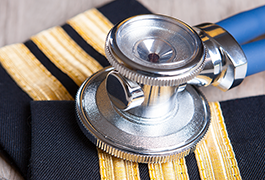Which Medical Do I Need?

Class I
A first class medical is required for pilots who exercise airline transport pilot (ATP) privileges; that is, those flying scheduled airliners and other pilots whose employers require this level of certification. A first class medical is valid for ATP privileges for twelve months for pilots under age 40. Pilots who are age 40 and older must renew First class medical certificates every six months.

Class II
A Second class is required for pilots who fly commercially—in operations such as crop dusting, delivering canceled checks, or carrying passengers or cargo for hire. The Second class medical is valid for commercial privileges for 12 months.

Class III
A Third class medical certificate is appropriate for student pilots, recreational pilots, and private pilots who fly for pleasure or personal business (but not for hire). A third class medical is valid for 60 months for pilots under age 40, and 24 months for applicants who are age 40 or older.
Medical Class Comparison
| Medical Certificate | Class I | Class II | Class III |
|---|---|---|---|
| Type Pilot | Airline Transport | Commercial |
Private, Student, Recreational |
| Duration |
6 months if age 40 or older; 12 months if under age 40 |
12 months |
2 years if age 40 or older; 5 years if less than 40 at exam |
| Distant Vision | 20/20 in each eye, with or without correction |
20/40 in each eye with or without correction |
|
|
Intermediate Vision 32 inches-panel |
50 years and older 20/40 with or without correction |
50 years and older 20/40 with or without correction |
N/A |
| Near Vision 16 inches | 20/40 in each eye, with or without correction | ||
| Color Vision | Colors necessary for safe performance of airman duties | ||
| Hearing | Conversational voice at 6 feet with both ears, or audiometry | ||
| Blood Pressure |
No standard. If medication required, will need cardiovascular workup. Current guideline maximum is 155/95. |
||
| EKG Electrocardiogram |
At age 35, and yearly after 40 |
N/A | N/A |
| ENT | No disease causing vertigo or disturbance of speech or equilibrium | ||